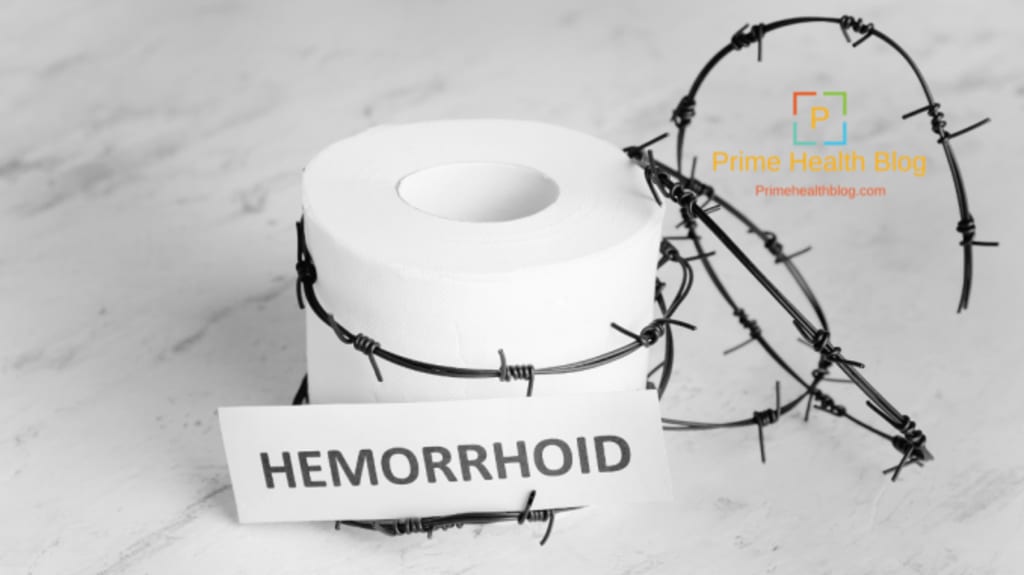Top Risks Of Hemorrhoids (Symptoms-Causes)
Hemorrhoids

Overview:
Hemorrhoids (HEM-uh-roids), also known as piles, are swollen veins in your anus and lower rectum, similar to varicose veins.
Hemorrhoids can develop within the rectum (internal hemorrhoids) or under the skin around the anus (external hemorrhoids).
Almost three out of four adults will have hemorrhoids from time to time. Hemorrhoids have a number of causes, but often the cause is unknown.
Fortunately, effective options are available to treat hemorrhoids. Many men and women get aid with home treatments and lifestyle modifications.
Symptoms of Hemorrhoids:
Signs and symptoms of psoriasis normally count on the type of hemorrhoid.
These are beneath the skin around your anus. Signs and symptoms might include:
Itching or irritation in your anal area
Pain or distress
Bleeding
Internal hemorrhoids lie within the anus. You usually can’t see or feel them, and they rarely result in distress. But distress or straining when passing stool can cause:
Painless bleeding during bowel movements. You may notice tiny amounts of bright red blood on your toilet tissue or in your toilet.
Thrombosed hemorrhoids
If blood pools in external hemorrhoid and creates a clot (thrombus), it can result in:
Intense pain
Swelling
Inflammation
A hard lump near your anus
Do not assume rectal bleeding is because of hemorrhoids, especially if you have changes in bowel habits or if your feces change in color or consistency.
Rectal bleeding can occur with other diseases, including colorectal cancer and rectal cancer.
Seek emergency care if you’ve got large quantities of rectal bleeding, lightheadedness, dizziness, or faintness.
Reasons for Hemorrhoids:
The veins around your anus tend to elongate under pressure and may bulge or swell.
Hemorrhoids can grow from increased stress in the lower rectum due to:
Straining during bowel movements
Sitting for long periods of time around the toilet
Having chronic constipation or diarrhea
Being obese
Having anal intercourse
Eating a low-fiber diet
Regular heavy lifting
As you age, your risk of hemorrhoids increases. That is because the cells that support the veins in your anus and anus may weaken and stretch.
This can also happen when you are pregnant since the baby’s weight puts pressure on the anal area.
Complications of Hemorrhoids
Complications of Hemorrhoids
Complications:
Rarely, chronic blood loss from hemorrhoids can lead to anemia, in which you do not have enough healthy red blood cells to transport oxygen to your cells.
Strangulated hemorrhoid – If the blood supply into an internal hemorrhoid is cut off, hemorrhoids may be”strangulated,” which may cause extreme pain.
Occasionally, a clot may form in the hemorrhoid (thrombosed hemorrhoid).
Though not dangerous, it can be extremely painful and sometimes has to be lanced and drained.
Prevention To prevent hemorrhoids and decrease symptoms of hemorrhoids, follow these hints:
Eat high-quality foods – Eat more fruits, vegetables, and whole grains.
Doing so softens the stool and increases its mass, which can help you avoid the distress that may cause hemorrhoids.
Add fiber to your diet slowly to avoid issues with gas.
Drink plenty of fluids – Drink six to eight glasses of plain water along with other fluids (not alcohol) daily to help keep stools soft.
The majority of individuals don’t get enough of the recommended amount of fiber — 20 to 30 grams a day — in their diet.
Should you use fiber supplements, make sure you drink at least eight glasses of water or other fluids every day. Otherwise, the supplements can cause or aggravate constipation.
Do not strain – Straining and holding your breath when trying to pass a stool creates increased pressure in the veins in the lower rectum.
Move as soon as you feel the impulse. If you wait to pass a bowel movement and the urge goes off, your feces may dry out and be harder to pass.
Stay active to help prevent constipation and to decrease pressure on veins, which can happen with long periods of standing or sitting.
Exercise may also help you lose excess weight which may be contributing to your own migraines.
Sitting too long, particularly in the bathroom, can raise the pressure on the veins in the anus.
Diagnosis for Hemorrhoid:
Your doctor might be able to see external hemorrhoids. Diagnosing internal hemorrhoids might consist of an evaluation of your anal canal and anus.
Digital evaluation – Your doctor inserts a gloved, lubricated finger into your rectum. He or she believes in something unusual, such as growths.
Visual inspection – Because internal hemorrhoids tend to be too soft to be felt during a rectal examination, your physician might examine the lower portion of your colon and anus with an anoscope, proctoscope, or sigmoidoscope.
Your doctor might want to examine Your Whole colon using colonoscopy if:
Your signs and symptoms suggest you could have another digestive system disease
You’re middle-aged and have not experienced a recent colonoscopy
Treatment and Home remedies for Hemorrhoids:
You can often relieve the pain, swelling, and inflammation of hemorrhoids with home treatments.
Eat high-quality foods – Eat more fruits, vegetables, and whole grains.
Doing this softens the stool and increases its bulk, which can help you stay away from the distress that may worsen symptoms from existing hemorrhoids.
Add fiber to your diet slowly to avoid issues with gas.
Utilize topical treatments – Employ an over-the-counter hemorrhoid cream or suppository containing hydrocortisone, or utilize pads containing witch hazel or a numbing agent.
Soak frequently in a hot tub or sitz bath. Soak your anal area in plain hot water for 10 to 15 minutes two to three times every day. A sitz bath fits over the bathroom.
Take pain relievers – With these remedies, hemorrhoid symptoms often go away within a week.
Watch your doctor per week in case you don’t get relief, or sooner if you have severe pain or bleeding.
Drugs for Hemorrhoids:
If your hemorrhoids create only mild discomfort, your physician may suggest over-the-counter creams, ointments, suppositories, or pads.
These products contain ingredients such as witch hazel, or hydrocortisone, and lidocaine, which can temporarily relieve pain and itching.
Don’t use an over-the-counter steroid lotion for more than a week unless directed by your physician since it may thin your skin.
External hemorrhoid thrombectomy:
When a painful blood clot (thrombosis) has formed within external hemorrhoid, your physician can remove the hemorrhoid, which may provide instant relief.
This process, done under local anesthesia, is best if performed within 72 hours of developing a clot.
For chronic bleeding or painful hemorrhoids, your physician might recommend one of the other minimally invasive procedures available.
These remedies can be performed in your physician’s office or other outpatient setting and do not usually require anesthesia.
Rubber band ligation
Your physician puts one or two tiny rubber bands around the base of internal hemorrhoid to cut off its circulation.
The hemorrhoid withers and falls off over a week.
Hemorrhoid banding can be embarrassing and lead to bleeding, which might begin two to four days after the procedure but is rarely severe.
Occasionally, more serious complications can occur. Your doctor injects a chemical solution into the hemorrhoid tissue to shrink it.
Though the injection causes little if any pain, it might be less powerful than rubber band ligation.
Coagulation (infrared, laser, or bipolar)
These techniques use a laser or infrared heat or light. Coagulation has few side effects and usually causes very little discomfort.
Just a small fraction of people with hemorrhoids require an operation.
But if other processes have not been successful or You’ve Got large hemorrhoids, your physician may recommend one of these:
Hemorrhoid removal (hemorrhoidectomy) – Selecting one of the various techniques, your physician removes excessive tissue that causes bleeding.
The surgery can be done with local anesthesia along with anesthesia, spinal anesthesia, or general anesthesia.
Hemorrhoidectomy is the most effective and complete way to deal with severe or recurring hemorrhoids.
Complications can include temporary trouble emptying your bladder, which could lead to urinary tract infections.
This complication occurs mainly after spinal anesthesia.
Most folks have any pain after the procedure, which medicines can alleviate. Soaking in a warm bath also might help.
This procedure, known as stapled hemorrhoidopexy, blocks blood flow to hemorrhoidal tissue. It’s ordinarily used only for internal hemorrhoids.
Stapling generally involves less pain than hemorrhoidectomy and permits for earlier return to regular activities.
Compared with hemorrhoidectomy, however, stapling has been associated with a greater risk of recurrence and rectal prolapse, in which part of the rectum protrudes from the anus.
Complications can also include bleeding, urinary retention, and pain, as well as, rarely, a life-threatening blood infection (sepsis). Talk with your doctor about the best alternative for you.
Preparing for your appointment:
If you have signs and symptoms of migraines, then make an appointment with your regular doctor.
If necessary, your physician may refer you to one or more specialists — including a physician with experience in the digestive system (gastroenterologist) or a colon and rectal surgeon — for treatment and evaluation.
Below are some suggestions that will help you get ready for the appointment.
Everything you can do:
Be conscious of any pre-appointment restrictions. When you make the appointment, ask whether there’s anything you have to do beforehand.
Make an inventory of:
Your symptoms and how long you’ve noticed them
Key personal information, including common bowel habits and diet, particularly your fiber intake
All medications, vitamins, or supplements you choose, including doses
For instance, a few questions to ask your doctor include:
What is the likely cause of my symptoms?
Is my condition going to be permanent or temporary?
Am I in danger of complications related to this particular condition?
What therapy approach do you recommend?
If treatments we try first do not work, what would you recommend next?
Can I be a candidate for surgery? Why or why not?
Are there any added self-care steps that might help?
I have other medical problems. How do I manage these together with hemorrhoids?
Don’t be afraid to ask different questions.
Things to expect from your doctor
Your doctor is Very Likely to ask you questions, including:
How embarrassing are your symptoms?
Which are your normal bowel habits?
How much fiber does your daily diet contain?
What, if anything, appears to improve your symptoms?
What, if anything, appears to worsen your symptoms?
Has anybody in your household had hemorrhoids or cancer of the colon, rectum, or anus?
Perhaps you have ever had a change in your bowel habits?
During bowel movements, have you ever noticed blood on your toilet paper, dripping into the bathroom or mixed to your stools?
What you can do in the meantime for hemorrhoids:
Prior to your appointment, take action to soften your stools.
Eat more high-fiber foods, such as fruits, vegetables, and whole grains, and also think about an over-the-counter fiber supplement, such as Metamucil or Citrucel.
Drinking six to eight glasses of plain water every day also might help alleviate your symptoms.
Ask your friends and loved ones for support. If you’re feeling anxious or depressed, consider joining a support group or seeking counseling. Believe in your ability to take control of the pain…
Hope you find this article helpful enough to give motivation. Kindly read our more articles and subscribe to us for staying updated on our all-new articles.
You can also read more health-related articles by subscribing and liking us on Facebook and Instagram. Feel Free to leave comments below for any suggestions or your views on it.
Thanks!!!
Leave a Reply






Comments
There are no comments for this story
Be the first to respond and start the conversation.